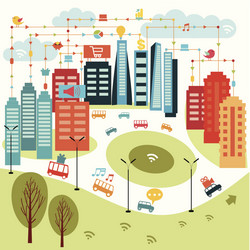Horizon 2020 projects light the way for smart cities across Europe
Europe is among the most urbanised regions on the globe. It estimated that by 2020, around 80 % of Europeans will be living in urban areas, in several countries the proportion will be 90 % or more. As we continue to magnetise towards urban hubs, we need ‘smart cities’ – places where networks and services are made more efficient with the use of digital and telecommunication technologies, for the benefit of inhabitants, businesses and the environment. The EU is trying to ensure that smart solutions for cities can be explored, implemented and replicated. With this is mind, three ‘lighthouse projects’ for smart cities and communities were funded under Horizon 2020 last year. Now in their kick-off phase, the three successful projects, GROWSMARTER, TRIANGULUM and REMOURBAN, were presented at last week’s Info Day on the upcoming Smart Cities & Communities 2015 call for proposals. GROWSMARTER The GROWSMARTER project is using its three lighthouse cities of Barcelona in Spain, Cologne in Germany and Stockholm in Sweden to showcase 12 smart city solutions in order to encourage uptake in other cities and communities. Solutions cover the areas of low energy districts, integrated infrastructures and sustainable urban mobility, and include deep retrofitting approach for buildings from the 60s and 70s, introducing vehicles fuelled from alternative sources and smart traffic management. The project team says that GROWSMARTER has the potential to create the equivalent of 1 500 jobs across Europe, and aims to reduce energy usage by 60 %, and cut EU transport emissions at project level by 60 %. GROWSMARTER predicts that by the end of the project, there should be up to 30 cities which are implementing, or will implement, its smart solutions. TRIANGULUM TRIANGULUM, meanwhile, was named as such because it represents an even balance between three core project elements: demonstration, dissemination and reciprocation. The project uses the three ‘hidden city champions’ of Eindhoven in the Netherlands, Manchester in the United Kingdom and Stavanger in Norway as lighthouse cities, and aims to implement pioneering concepts for sustainable energy supply, mobility, and information technology. In Manchester, the project will transform the student quarter into a smart city district by renovating historical buildings and building up an autonomous energy grid, among other things. In Eindhoven, two districts will likewise be transformed into sustainable living environments, and in Stavanger one of the focuses is on shifting mobility to e-mobility – an advanced fiber-optics infrastructure will be introduced, as well as various energy and mobility projects. REMOURBAN The REMOURBAN project, which was also chosen from among last year’s 19 responses to the Smart Cities and Communities call, is hosting its kick-off meeting this week. Working with the three lighthouse cities of Eskisehir in Turkey, Nottingham in the United Kingdom and Valladolid in Spain, the emphasis will be on reaching a holistic approach where energy production, distribution and use; mobility and transport; and ICT come to form a continuum. In the energy sector, REMOURBAN will seek to drive down consumption through retrofitting solutions and enhanced electricity management. The mobility sector will deal with fuel types and multimodal strategies among other things. Urban infrastructures will be optimised through ICT solutions such as e-ticketing systems, while ICT will also be an enabler for smart grid strategies and city information platforms. The idea behind lighthouse projects is that they act as an example and stimulus for other cities to adapt and replicate their solutions. As well as the core cities, lighthouse projects also incorporate ‘follower’ cities as an important element to ensure wider take up. Organisations interested in applying for the 2015 Smart Cities & Communities calls for proposals, can find more information here: http://ec.europa.eu/research/participants/portal4/desktop/en/opportunities/h2020/calls/h2020-scc-2015.html(opens in new window)
Countries
Germany, Spain, Netherlands, Norway, Sweden, Türkiye, United Kingdom



